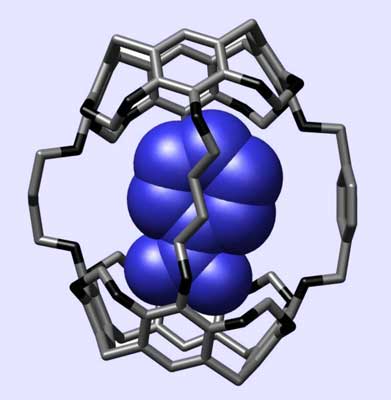|
|
Donald James Cram (April 22, 1919 – June 17, 2001) was an American chemist who shared the 1987 Nobel Prize in Chemistry for “synthesizing three-dimensional molecules that could mimic the functioning of natural molecules.” He also won the National Academy of Science Award in the Chemical Sciences and was member of the International Academy of Science. Cram was born in Chester, Vermont, [1] and died in Palm Desert, California. [2] Education Cram was educated at Rollins College, Florida, and at the University of Nebraska - Lincoln, and he received his doctorate in organic chemistry from Harvard University in 1947. He joined the faculty of the University of California, Los Angeles in 1947 and became a full professor there in 1956.
Crystal structure of a nitrobenzene bound within a hemicarcerand reported by Cram and coworkers in Chem. Commun., 1997, 1303-1304. Field of study Cram expanded upon Charles Pedersen's ground-breaking synthesis of crown ethers, basically two-dimensional organic compounds that are able to recognize and selectively combine with the ions of certain metal elements. Cram synthesized molecules that took this chemistry into three dimensions, creating an array of differently shaped molecules that could interact selectively with other chemicals because of their complementary three-dimensional structures. His work represented a large step toward the synthesis of functional laboratory-made mimics of enzymes and other natural molecules whose special chemical behavior is due to their characteristic structure. He also did work in stereochemistry and Cram's rule of asymmetric induction is named after him. As a teacher Not only was he a researcher, but he was a popular teacher as well, having instructed some 8,000 undergraduates in his career and guided the academic output of 200 graduate students. He entertained his classes by strumming his guitar and singing folk songs. (UCLA news release of June 19, 2001, at [3].) He showed a self-deprecating style, being quoted as saying: "An investigator starts research in a new field with faith, a foggy idea, and a few wild experiments. Eventually the interplay of negative and positive results guides the work. By the time the research is completed, he or she knows how it should have been started and conducted." Links * http://www.nobel.se/chemistry/laureates/1987/cram-autobio.html * http://www.brainyquote.com/quotes/quotes/d/donaldcram193831.html Retrieved from "http://en.wikipedia.org/"

|
|
|||||||||||
